A Look Back at NACTO Designing Cities 2025 in Washington, D.C.
by Odochi Akwani, Writer and Content Manager
June 24, 2025
Updated on 6/25/2025 for accuracy and clarification regarding Capital Bikeshare on Day 2.
A recap of the Better Bike Share Partnership’s role and participation at the National Association of Transportation Official’s Designing Cities Conference.
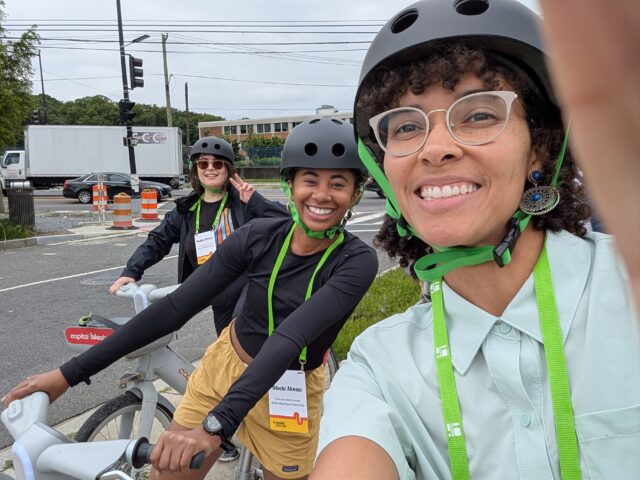
As a core member of BBSP, the National Association of City Transportation Officials (NACTO) works together alongside our other partners at the City of Philadelphia and PeopleForBikes to advance equity in shared micromobility. Namely, NACTO leads the Transportation Justice Fellowship, which just wrapped up its fourth year. Last month in Washington, D.C., we came together for NACTO’s annual Designing Cities conference. BBSP was proud to partner with NACTO on a few activities during the conference, including the annual BBSP Shared Micromobility Roundtable, a Shared Micromobility Peer Happy Hour, as well as having current and alumni Transportation Justice Fellows in attendance serving as panel moderators and speakers.
DAY 1
To kick off the conference, BBSP hosted our annual Shared Micromobility Roundtable. It’s a convening in line with our mission that brings together practitioners working to make shared micromobility programs more equitable across North America. We shared personal experiences and challenges and put thought and discussion into strategies to support equitable SMM programming. My table discussed sidewalk competition and various parking strategies as well as shared mobility hubs, station design tailored to the needs of women or those living with disabilities, and the integration of e-bikes and station electrification. Through this discussion, I learned about the Mobility Hubs for Women and Caregivers – Design Framework and Report from the Shared-Use Mobility Center, which outlines design principles based on personas.
Attendees got the local perspective from the District Department of Transportation (DDOT) and the City of Alexandria, Virginia, two of the jurisdictions that own Capital Bikeshare (CaBi), Greater D.C.’s bike share system, which is operated by Lyft. Sean Martin, shared mobility planner at the City of Alexandria, and Greg Matlesky, bicycle program specialist at DDOT, presented on how they operate a system that operates across eight jurisdictions. CaBi has hit record after record in regards to ridership in the last few years, mostly attributed to the use of e-bikes. Even with the rise in e-bike ridership, CaBi plans to maintain its classic bike fleet. With three operators in D.C., including dockless bikes and scooters, Martin and Matlesky spoke on the question of whether dockless systems are a competition or complement to the city. Matlesky believes it’s a compliment because, alongside CaBi, a dockless system is still helping to make the case for safe cycling infrastructure.
This year, our 11 Transportation Justice Fellows presented their research projects. Nour Katabi, Jenee Malloy, Diana Voss-Gonzalez, and Rachel Brown presented “Two Coasts, One Goal: Advancing Seamless Micromobility Connections to Transit,” comparing the integration of shared micromobility and public transit in NYC/NJ versus Los Angeles. Fellows Brother Lloyd Cheatom, Jolanda Hill, Jeremiah Franklin, and Adriana Lopez Hernandez presented “Opportunities for Equity,” showcasing community engagement best practices through educational programming and community ambassador programs, as well as highlighting the benefits of community partnerships. Lastly, fellows Tenzin Choepel, Jonathan Gomez-Pereira, and Elizabeth Santiago presented “Exploring Adaptive Bikeshare” to spotlight different types of adaptive programs and how they are increasing access to SMM.
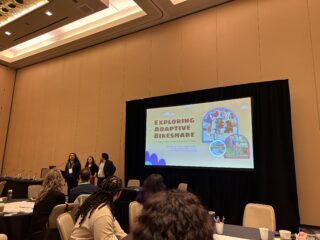
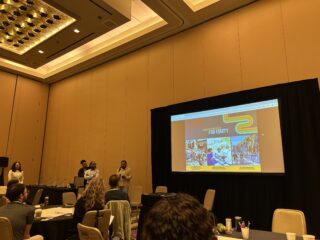
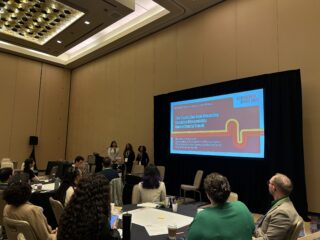
DAY 2
Day two of the conference began with walkshops! Tangier Barnes Wright, deputy director of shared micromobility at PeopleForBikes, and I attended the Bikeshare Behind the Scenes: Capital Bikeshare Warehouse Tour via the Metropolitan Branch Trail for a 12-mile ride out and back on CaBi e-bikes. The route featured a combination of off-street bike paths, protected bike lanes, and painted bike lanes. Convenient water stations are located along the trail provided by the Friends of the Metropolitan Branch Trail.
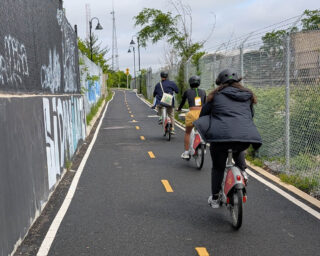
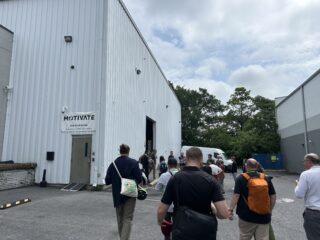
The tour was at one of two Motivate warehouses for CaBi, the operations and logistics partner. We saw where a fleet of more than 7,000 bikes are assembled, maintained, and deployed. Although 65% of trips are taken on e-bikes, only 35% of the fleet is e-bikes. According to Aaron Goldbeck, manager of the Sustainable Transportation Programs Branch at DDOT, CaBi’s the popularity of ebikes has led to much higher operational costs than anticipated. Sudden large increases in ridership and equity program participation have led them to implement fare changes to ensure the financial sustainability of the system. E-bike fees will increase, and the equity program will go from unlimited e-bike trips to a monthly credit-based system.
BBSP then hosted a peer happy hour at a locally owned vegetarian taco restaurant, Chaia Tacos. Thank you to all who attended! It was packed. Friends and colleagues working in shared micromobility came together to share delicious, visionary cuisine while reflecting on recent wins and challenges and sharing personal experiences. It was a gift that we had multiple people without direct ties to shared micromobility attend. They came with their friends who work in shared micromobility. This led to different and unique conversations about how shared micromobility fits into the larger conversation around energy consumption and the grid and how shared micromobility is shaping the way people get around.
DAY 3
NACTO 2025 closed out with a closing plenary from Charles T. Brown, founder of Equitable Cities, an urban planning, public policy, and research firm working at the intersection of transportation, health, and equity. Brown posed the question “Who are you designing for?” to encourage attendees to rethink how they show up in their roles when planning cities. He underscored how, as public servants, we should be designing for freedom, not for comfort. “Equity is not a suggestion, it’s the law.” Brown’s new book, Arrested Mobility: Overcoming the Threat to Black Movement, explores how and why mobility is policed for Black people around the world.
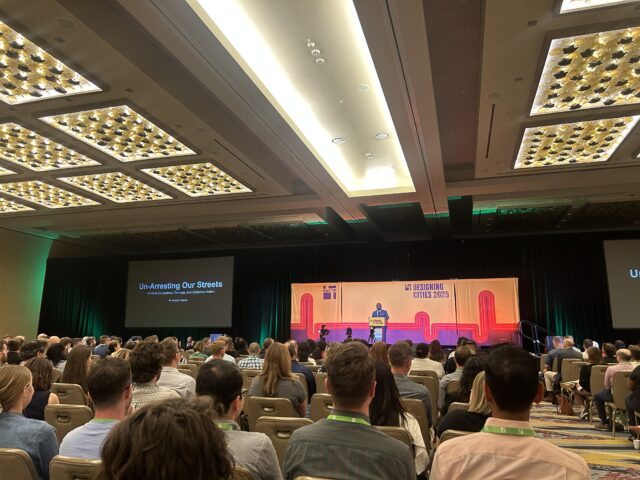
With NACTO’s annual Designing Cities conference bringing together more than 1,000 folks passionate about transportation, it’s a great opportunity to convene and share best practices, collaborate on common challenges, and identify operational strategies to support equitable shared micromobility. Connect with us this fall in Montreal, Quebec, at the North American Bikeshare and Scootershare Association annual conference!
________________________________________________________________________________________
The Better Bike Share Partnership is funded by The JPB Foundation as a collaboration between the City of Philadelphia, the National Association of City Transportation Officials (NACTO), and the PeopleForBikes Foundation to build equitable and replicable bike share systems. Follow us on LinkedIn, Facebook, Twitter, and Instagram, or sign up for our weekly newsletter.
Have a question or a story idea? Email odochi@peopleforbikes.org.
